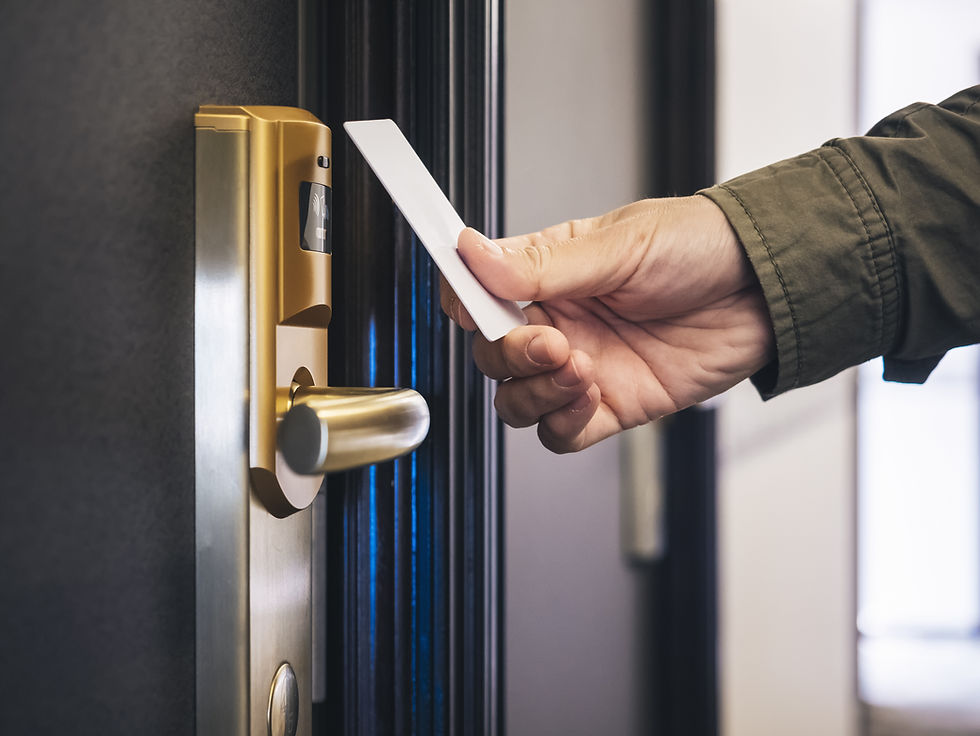English reading practice - Travel - A Seamless Hotel Experience (C1/C2 Advanced)
- Karen Hunter
- Apr 16, 2024
- 3 min read
Stepping into a new city or country brings with it a sense of excitement and anticipation. However, as a foreign visitor, navigating the nuances of hotel stays can sometimes be daunting. From unfamiliar vocabulary to cultural customs, understanding the process from check-in to check-out can significantly enhance your overall travel experience. Let’s embark on a journey through the typical hotel stay, demystifying the terminology and procedures along the way.
Check-in:
Upon arrival at the hotel, you'll typically head to the reception desk to check in. Here, you'll be greeted by the front desk staff, who may ask for your reservation details and a form of identification, such as a passport or driver’s license. Don't be surprised if they request a credit card for additional charges or as a security deposit.
Vocabulary you might hear:
Reservation: This refers to the booking you made in advance to secure your room.
Identification: Your passport or driver’s license, used to verify your identity.
Credit card authorisation: A hold placed on your credit card to cover any potential additional charges during your stay.
Room Allocation:
Once checked in, you'll receive your room key or key card. The staff will then direct you to your assigned room. If you have any specific preferences or requests, such as a higher floor or a room with a view, it’s best to mention them during check-in, though they may be subject to availability.
Vocabulary you might hear:
Room key/key card: The physical or electronic device used to access your room.
Room preferences: Special requests regarding your room, such as location or amenities.

Room Amenities:
Upon entering your room, take a moment to familiarise yourself with its amenities and any safety instructions. There may be a bed(s), a bathroom with toiletries, a television, a minibar, and possibly a safe for storing valuables. Safety instructions are often on the back of the door.
Vocabulary you might hear:
Toiletries: Complimentary personal care items provided by the hotel, such as soap, shampoo, and conditioner.
Minibar: A small refrigerator stocked with beverages and snacks, usually sold at a premium additional cost.
During Your Stay:
Throughout your stay, you might encounter various hotel staff members, such as housekeeping, concierge, or room service. Don't hesitate to ask for assistance or recommendations—they're there to ensure your comfort and satisfaction.
Vocabulary you might hear:
Housekeeping: The department responsible for cleaning and maintaining guest rooms.
Concierge: A staff member who assists guests with various services, such as restaurant reservations, transportation arrangements, or local sightseeing recommendations.
Room service: The option to have food and beverages delivered to your room.
Check-out:
As your stay comes to an end, it's time to check out. You'll need to settle any outstanding charges, return your room key or key card, and express any feedback you may have about your experience.
Vocabulary you might hear:
Settle bill: Pay any remaining fees for services or incidentals incurred during your stay.
Feedback: Your thoughts or comments about your experience, which hotels often value for improving their services.
Navigating a hotel stay as a foreign visitor doesn't have to be an overwhelming experience. By familiarising yourself with common vocabulary and understanding the check-in to check-out process, you can make the most of your accommodation experience. Remember, hotel staff are there to assist you every step of the way, ensuring a comfortable and enjoyable stay.
So, whether you’re embarking on a solo adventure, a romantic getaway, or a family holiday, embrace the journey, and let your hotel stay be a seamless part of your travel experience.
Check your understanding
What documents might the front desk staff ask for during check-in?
Describe two types of room amenities mentioned in the article.
Who are some of the hotel staff members that guests might interact with during their stay?
What should guests do during check-out to ensure a smooth departure?
Why is it important for guests to communicate any room preferences or special requests during check-in?
You can now listen to this article as a podcast just click here
If you find this practice useful please consider supporting the author from just £1 per month here



Comments